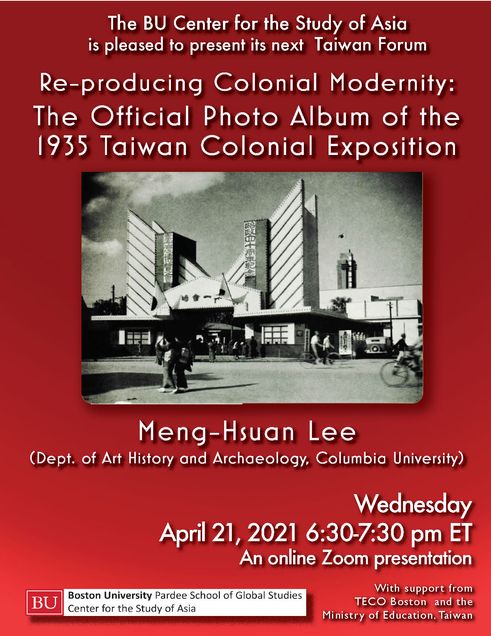Re-producing Colonial Modernity: Official Photo Album of the 1935 Taiwan Colonial Exposition (April 21, 2021 Taiwan Forum)
The Boston University Center for the Study of Asia is pleased to present its next lecture in the
Taiwan Forum Public Lecture Series
Re-producing Colonial Modernity: Official Photo Album
of the 1935 Taiwan Colonial Exposition
Meng-Hsuan Lee
(Department of History of Art and Archaeology, Columbia University)
Wednesday, April 21, 2021 from 6:30-7:30 pm ET
The “The Taiwan Exposition: In Commemoration of the First Forty Years of Colonial Rule” (始政四十年記念台灣博覽會), commonly referred to as the “1935 Taiwan Exposition,” was the largest of its kind during the Japanese colonial era. Both recent academic and popular literature have made it a pivotal moment in Taiwanese history, with a renewed interest in Japanese colonization. Previous research has covered various subjects, such as colonial representations of progress vs. exoticism, systematic introduction of modernist architecture, and how colonial subjects were educated and disciplined through the exposition. However, the photographs from the official Photo Album, produced alongside the exposition, have largely been treated only as historical documents. Its photographic nature and the fact that it was intended as a photobook, have largely gone unnoticed.
This paper argues that the Photo Album assumes the role of a colonial museum photographed and reproduced on paper. I use the concept of the museum as a “modern machine” that not only reflected modernity, but also actively reproduced modernity through a “modern visual regime.” The photographic museum on paper documented the modern and eclectic architecture of the exposition while further “constructing” the architectural program of the exposition. The Photo Album helped to reinforce the idea of progress achieved by colonial enterprise and projected a future of the colony of Taiwan as an agriculturo-industrial base for the empire’s southward expansion.
About the Speaker:
 Meng-Hsuan Lee 李孟瑄 is a third-year Ph.D. student in Columbia University’s Art History and Archaeology program. He studies modern architecture, with a focus on Japanese colonial architecture and urbanism in Taiwan. His current project uses the uses of framework of architectural screenology to investigate the rise of façadism in 1920s and 30s Taiwanese cities. More broadly, he is interested in the intersection of media and architecture, global colonialisms, and architectural preservation.
Meng-Hsuan Lee 李孟瑄 is a third-year Ph.D. student in Columbia University’s Art History and Archaeology program. He studies modern architecture, with a focus on Japanese colonial architecture and urbanism in Taiwan. His current project uses the uses of framework of architectural screenology to investigate the rise of façadism in 1920s and 30s Taiwanese cities. More broadly, he is interested in the intersection of media and architecture, global colonialisms, and architectural preservation.
Prior to joining Columbia in 2018, Meng received his M.A. in Humanities (art history) from the University of Chicago, where he worked as a research assistant in Japanese art and wrote his master’s thesis examining the politics of urban memory surrounding Shih-Shih South Village 四四南村, an architectural preservation project in Taipei. Previously, he received his B.A. in Drama and Theatre from National Taiwan University.
Support for the BUCSA Taiwan Forum series is provided by the
Taipei Economic and Cultural Office Boston Education Division,
and the Taiwan Ministry of Education
